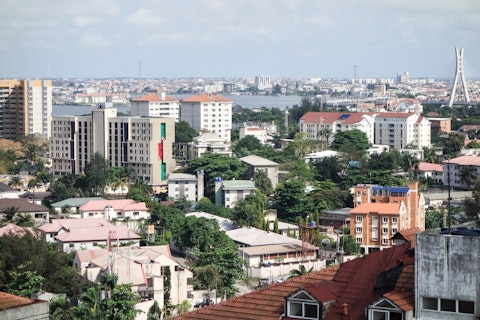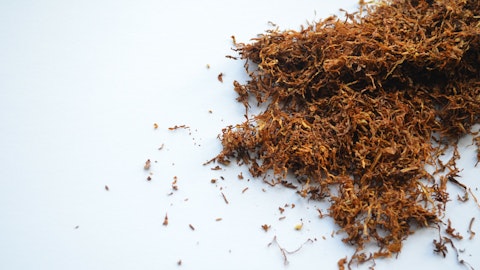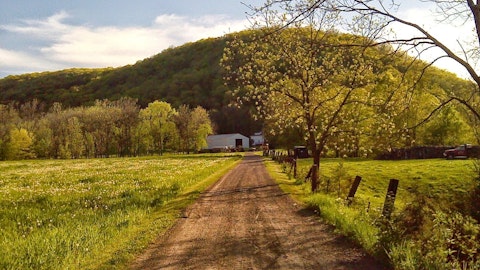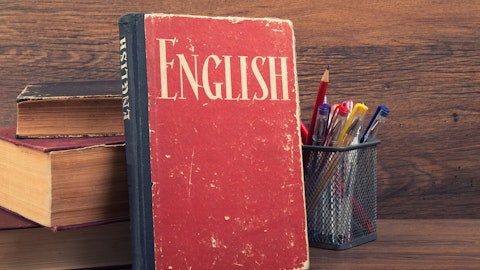In this article we will look at the 15 Freest Countries in Africa. We will also discuss the African Economic Outlook and some leading players in the African economy.
Freedom in a country is defined by the political, civil, and economic liberty an administration has to offer its citizens. According to the Freedom in the World 2024 Report by Freedom House, global freedom declined for the 18th consecutive year in 2023. Political and civil liberties fell in 51 countries, whereas only 21 countries witnessed an improvement. The major contributing factors to diminishing freedom include flawed elections and the rise in armed conflicts around the globe. According to a report by the International Institute of Strategic Studies, the global intensity of armed conflicts has risen year on year from 2022 to 2023, with the number of events increasing by 28% and the number of fatalities increasing by 14%. You can also look at the 25 Freest Countries In the World.
Economic Outlook of Africa
The level of economic liberty and free markets contribute towards the overall freedom in a country. Moreover, the regional economic outlook is one of the contributing factors in determining economic freedom. According to the April 2024 report by the IMF, the economy of sub-Saharan Africa is on the mend after 4 years of economic turbulence. The growth in the region is expected to rise from 3.4% in 2023 to 3.8% in 2024, with approximately two-thirds of the African countries anticipating higher growth. The economic recovery trend is expected to continue in 2025, with growth expected at 4.0%. Moreover, the regional median inflation rates have decreased to almost half, from 10% in November 2022 to 6% in February 2024.
Although the regional economy is forecasted to grow at 4% in 2025, it has to tackle some challenges. Some of the challenges the regional governments face include financial shortage, high cost of borrowing, and rollover risks due to low domestic resource mobilization. Moreover, significant loan and debt repayments are looming in 2024 and 2025. On March 7, Reuters reported that Egypt, a North African country, signed a $8 billion support program with the IMF, letting its currency depreciate beyond 50 Egyptian pounds against the dollar. This borrowing spree has led its foreign creditors to shy away from investing due to the high interest rates and a huge deficit. As a result, the foreign remittances for the country fell to approximately 30% in 2023 and were measured at $22 billion.
According to the IMF, African governments must make policy decisions to address these challenges. Some of the policy directives suggested by the IMF include improving public finance, maintaining price instability, and diversifying financing sources and growth. Some African countries are already succeeding in fighting these challenges. On February 28, Reuters reported that Namibia raised its economic growth forecasts for 2023 and 2024 due to the improved oil and mining sector. The economy is now estimated to have grown by 5.6% against the previous projections of 3.5% in 2023. Furthermore, the country’s economy is forecasted to grow 4.0% in 2024 against the earlier estimates of 2.9%.
Key Players Leading the African Economy
MTN Group Limited (JSE:MTN), Shoprite Holdings Limited (JSE:SHP), and Sasol Limited (NYSE:SSL) are some of the companies leading growth in Africa.
MTN Group Limited (JSE:MTN) is an integrated telecommunications services company based in South Africa. On April 17, MTN Group Limited (JSE:MTN) announced the inauguration of the Technology Innovation lab at MTN Group Limited’s (JSE:MTN) headquarters in collaboration with Huawei. The newly inaugurated lab is considered a significant milestone towards catalyzing the digital progress of Africa. It will be crucial in MTN Group Limited’s (JSE:MTN) evolution to provide comprehensive digital technologies.
Shoprite Holdings Limited (JSE:SHP) is one of the largest retail companies in Africa that sells consumer goods. The company mainly deals in food retailing, pharmaceuticals, hospitality, ticketing, furniture, and digital commerce products. On April 8, Shoprite Holdings Limited (JSE:SHP) announced its collaboration with four other leading global retailers to establish W23 Global, a collaborative venture fund. The W23 Global comprises Shoprite Holdings Limited (JSE:SHP), Ahold Delhaize, Tesco, Woolworths Group, and Empire Company Limited. The fund is expected to invest $125 million over the next 5 years in innovative start-ups and will scale up the global grocery retail sector. Each retailer is expected to be an equal partner of W23 Global, and the CEOs will make up the investment committee.
Sasol Limited (NYSE:SSL) is a leading international oil and chemical production company headquartered in South Africa. The company deals in automotive lubricants, fuels, and polymers throughout the globe. On March 14, Sasol Limited (NYSE:SSL) launched Zaffra in collaboration with Topsoe, one of the leaders in carbon emission reduction technologies. Zaffra is expected to become a leading player in the aviation industry as it will focus on developing and delivering sustainable fuel for aviation.
With this context, let’s take a look at the 15 freest countries in Africa.

Bill Kret/Shutterstock.com
Our Methodology
To compile the list of 15 freeset countries in Africa, we first created our world freedom index based on the data collected from 3 sources. We used global rankings from Freedom House’s Freedom in the World Report 2024, Cato Institute’s Human Freedom Index 2023, and Heritage Foundation’s Index of Economic Freedom 2024. As the total number of countries covered by these sources was not equal, we calculated the percentile for each country by dividing each country’s rank by the total number of countries covered in the respective index. Once we had the percentile for all countries, we averaged them and ranked the countries according to the average percentile to get the Insider Monkey world freedom ranking.
For this article, we shortlisted the African countries from Insider Monkey world freedom ranking and sorted them in ascending order based on their global ranking. We have also included population figures and the real GDP growth rates from the IMF in our list descriptions.
15 Freest Countries in Africa
15. Kenya
Freedom House Ranking (2024): 117
Human Freedom Ranking (2023): 93
Economic Freedom Ranking (2024): 120
Insider Monkey World Freedom Ranking: 123
Kenya is an East African country on the coastline of the Indian Ocean. It ranks as the 15th Freest country in Africa, with a real GDP growth rate of 5% in 2024. Moreover, the country has a population of 52.44 million as of 2024.
14. Côte d’Ivoire
Freedom House Ranking (2024): 121
Human Freedom Ranking (2023): 102
Economic Freedom Ranking (2024): 91
Insider Monkey World Freedom Ranking: 117
Côte d’Ivoire ranks 14th on our list of freest countries in Africa. It is a West African country with a real GDP growth rate of 6.5% and has a total population of 31.98 million.
13. Madagascar
Freedom House Ranking (2024): 107
Human Freedom Ranking (2023): 107
Economic Freedom Ranking (2024): 97
Insider Monkey World Freedom Ranking: 116
With a real GDP growth rate of 4.5% and a total population of 30.59 million, Madagascar ranks 13th on our list of 15 freeset countries in Africa.
12. The Gambia
Freedom House Ranking (2024): 120
Human Freedom Ranking (2023): 90
Economic Freedom Ranking (2024): 93
Insider Monkey World Freedom Ranking: 110
The Gambia, a West African country, is the 12th freest country in Africa. It has an Insider Monkey world freedom ranking of 110, and its real GDP is growing at 6.2% in 2024.
11. Malawi
Freedom House Ranking (2024): 90
Human Freedom Ranking (2023): 79
Economic Freedom Ranking (2024): 129
Insider Monkey World Freedom Ranking: 109
Malawi is an East Asian country. It ranks 11th on our list, with a GDP growth rate of 3.3%. Moreover, the country has a total population of 23.38 million as of 2024.
10. Senegal
Freedom House Ranking (2024): 87
Human Freedom Ranking (2023): 85
Economic Freedom Ranking (2024): 108
Insider Monkey World Freedom Ranking: 104
Making it to the top 10 of our list of 15 freest countries in Africa is Senegal. It is a West African country with a total population of approximately 18.66 million as of 2024. Moreover, the country’s real GDP is growing at 8.3%.
9. Benin
Freedom House Ranking (2024): 101
Human Freedom Ranking (2023): 76
Economic Freedom Ranking (2024): 95
Insider Monkey World Freedom Ranking: 99
Benin is a small West African country with a total population of 14.13% as of 2024. The country ranks 9th on our list of the 15 freest countries in Africa. In addition, Benin has experienced real GDP growth of 6% during the current year.
8. South Africa
Freedom House Ranking (2024): 70
Human Freedom Ranking (2023): 73
Economic Freedom Ranking (2024): 110
Insider Monkey World Freedom Ranking: 94
South Africa ranks as the 8th freest country in Africa, with an Insider Monkey world freedom ranking of 94. The country has a total population of 62.47 million, and its real GDP is growing at 0.9% in 2024.
7. Ghana
Freedom House Ranking (2024): 67
Human Freedom Ranking (2023): 66
Economic Freedom Ranking (2024): 104
Insider Monkey World Freedom Ranking: 85
Ghana is another West African country that ranks 7th on our list. It has an Insider Monkey world freedom ranking of 85 and has a total population of 33.74 million as of 2024.
6. Namibia
Freedom House Ranking (2024): 74
Human Freedom Ranking (2023): 62
Economic Freedom Ranking (2024): 96
Insider Monkey World Freedom Ranking: 82
Namibia is a small Southern African country with a population of approximately 2.69 million. The country ranks as the 6th freest country in Africa, with a real GDP growth rate of 2.6% in 2024.
5. Seychelles
Freedom House Ranking (2024): 70
Human Freedom Ranking (2023): 40
Economic Freedom Ranking (2024): 78
Insider Monkey World Freedom Ranking: 68
Making it to the top 5 freest countries in Africa is Seychelles. It is an East African country with one of the smallest populations of only 0.1 million. The country’s real GDP will grow at 3.2% in 2024.





